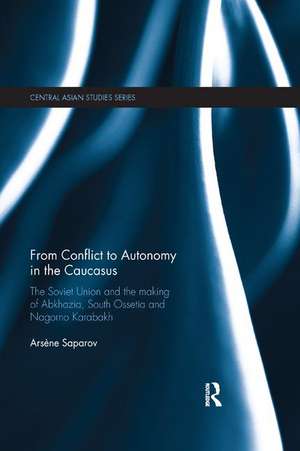From Conflict to Autonomy in the Caucasus: The Soviet Union and the Making of Abkhazia, South Ossetia and Nagorno Karabakh: Central Asian Studies
Autor Arsène Saparoven Limba Engleză Paperback – 12 ian 2018
From Conflict to Autonomy in the Caucasus questions this assumption by examining three case studies: Abkhazia, South Ossetia and Nagorno Karabakh are placed within the larger socio-political context of transformations taking place in this borderland region during the nineteenth and twentieth centuries. It examines demographic, social and economic consequences of the Russian colonization and resulting replacement of traditional societies and identities with modern ones. Based on original Russian language sources and archival materials, the book brings together two periods that are usually studied separately – the period of the Russian Civil War 1917–20 and the early Soviet period – in order to understand the roots of the Bolshevik decision-making policy when granting autonomies. It argues that rather than being the product of blatant political manipulation this was an attempt at conflict resolution. The institution of political autonomy, however, became a powerful tool for national mobilization during the Soviet era.
Contributing both to the general understanding of the early Soviet nationality policy and to our understanding of the conflicts that have engulfed the Caucasus region since the 1990s, this book will be of interest to scholars of Central Asian studies, Russian/Soviet history, ethnic conflict, security studies and International Relations.
| Toate formatele și edițiile | Preț | Express |
|---|---|---|
| Paperback (1) | 309.69 lei 6-8 săpt. | |
| Taylor & Francis – 12 ian 2018 | 309.69 lei 6-8 săpt. | |
| Hardback (1) | 847.75 lei 6-8 săpt. | |
| Taylor & Francis – 30 iul 2014 | 847.75 lei 6-8 săpt. |
Din seria Central Asian Studies
-
 Preț: 379.30 lei
Preț: 379.30 lei -
 Preț: 354.69 lei
Preț: 354.69 lei -
 Preț: 324.35 lei
Preț: 324.35 lei -
 Preț: 348.60 lei
Preț: 348.60 lei -
 Preț: 394.09 lei
Preț: 394.09 lei - 12%
 Preț: 299.52 lei
Preț: 299.52 lei - 18%
 Preț: 1164.44 lei
Preț: 1164.44 lei -
 Preț: 407.52 lei
Preț: 407.52 lei - 26%
 Preț: 764.20 lei
Preț: 764.20 lei - 18%
 Preț: 1057.75 lei
Preț: 1057.75 lei - 28%
 Preț: 821.06 lei
Preț: 821.06 lei - 18%
 Preț: 1111.40 lei
Preț: 1111.40 lei - 13%
 Preț: 297.57 lei
Preț: 297.57 lei - 18%
 Preț: 1055.51 lei
Preț: 1055.51 lei - 14%
 Preț: 312.77 lei
Preț: 312.77 lei - 16%
 Preț: 299.52 lei
Preț: 299.52 lei - 19%
 Preț: 702.06 lei
Preț: 702.06 lei - 18%
 Preț: 1056.35 lei
Preț: 1056.35 lei - 18%
 Preț: 727.19 lei
Preț: 727.19 lei - 16%
 Preț: 260.93 lei
Preț: 260.93 lei - 18%
 Preț: 1218.34 lei
Preț: 1218.34 lei -
 Preț: 407.78 lei
Preț: 407.78 lei -
 Preț: 482.74 lei
Preț: 482.74 lei -
 Preț: 419.70 lei
Preț: 419.70 lei -
 Preț: 416.22 lei
Preț: 416.22 lei - 18%
 Preț: 1053.16 lei
Preț: 1053.16 lei - 18%
 Preț: 1014.65 lei
Preț: 1014.65 lei -
 Preț: 436.14 lei
Preț: 436.14 lei - 18%
 Preț: 1057.05 lei
Preț: 1057.05 lei - 18%
 Preț: 1060.87 lei
Preț: 1060.87 lei - 26%
 Preț: 763.23 lei
Preț: 763.23 lei -
 Preț: 488.71 lei
Preț: 488.71 lei - 18%
 Preț: 1108.42 lei
Preț: 1108.42 lei - 18%
 Preț: 1057.05 lei
Preț: 1057.05 lei - 31%
 Preț: 767.47 lei
Preț: 767.47 lei
Preț: 309.69 lei
Preț vechi: 362.79 lei
-15% Nou
Puncte Express: 465
Preț estimativ în valută:
59.26€ • 63.37$ • 49.41£
59.26€ • 63.37$ • 49.41£
Carte tipărită la comandă
Livrare economică 18 aprilie-02 mai
Preluare comenzi: 021 569.72.76
Specificații
ISBN-13: 9781138476158
ISBN-10: 1138476153
Pagini: 216
Ilustrații: 9 Line drawings, black and white; 3 Tables, black and white; 9 Illustrations, black and white
Dimensiuni: 156 x 234 x 17 mm
Greutate: 0.32 kg
Ediția:1
Editura: Taylor & Francis
Colecția Routledge
Seria Central Asian Studies
Locul publicării:Oxford, United Kingdom
ISBN-10: 1138476153
Pagini: 216
Ilustrații: 9 Line drawings, black and white; 3 Tables, black and white; 9 Illustrations, black and white
Dimensiuni: 156 x 234 x 17 mm
Greutate: 0.32 kg
Ediția:1
Editura: Taylor & Francis
Colecția Routledge
Seria Central Asian Studies
Locul publicării:Oxford, United Kingdom
Public țintă
PostgraduateCuprins
Introduction
1. Caucasus between Empires 1801-1918
2. Abkhazia 1917-1931
3. South Ossetia 1918-1922
4. Nagorno-Karabakh 1918-1921
5. Towards Karabakh autonomy 1921-1925
6. Arbitrary Borders? The Bolsheviks Drawing Boundaries in the South Caucasus
7. From Autonomy to Conflict 1921 – 1991
Conclusion
1. Caucasus between Empires 1801-1918
2. Abkhazia 1917-1931
3. South Ossetia 1918-1922
4. Nagorno-Karabakh 1918-1921
5. Towards Karabakh autonomy 1921-1925
6. Arbitrary Borders? The Bolsheviks Drawing Boundaries in the South Caucasus
7. From Autonomy to Conflict 1921 – 1991
Conclusion
Notă biografică
Arsène Saparov received a PhD in International Relations from the London School of Economics, UK, in 2007. He now teaches Russian/Soviet and Caucasian history at the University of Michigan, Ann Arbor, USA. His research focuses on ethnic conflicts in the Caucasus, and Russian and Soviet history.
Recenzii
Saparov's concentrated study expands understating of Soviet nationality policy, and demonstrates how the peoples of the South Caucasus navigated it. - M. Chakars, Saint Joseph's University
Overall, in terms of aims and analyses, Saparov’s book has the potential to be an outstanding work, dealing with the very complex subject that is boundary making in Abkhazia, South Ossetia and Karabakh. This book is a useful source to all researchers and students who are interested in ethnic conflict, nation building and conflict resolution in the former Soviet Union. - OHANNES GEUKJIAN, American University of Beirut, Beirut, Lebanon
Overall, in terms of aims and analyses, Saparov’s book has the potential to be an outstanding work, dealing with the very complex subject that is boundary making in Abkhazia, South Ossetia and Karabakh. This book is a useful source to all researchers and students who are interested in ethnic conflict, nation building and conflict resolution in the former Soviet Union. - OHANNES GEUKJIAN, American University of Beirut, Beirut, Lebanon
Descriere
From Conflict to Autonomy in the Caucasus analyses the relation of the Soviet nationality policy and modern ethnic conflicts in the post-Soviet space. The book explains why the Bolsheviks granted autonomous status to ethnic minorities in the South Caucasus, focusing in particular on Abkhazia, Nagorno-Karabakh and South Ossetia. It questions the assumption that the Soviet leadership deliberately set up ethnic autonomies within the republics, thereby giving Moscow unprecedented leverage against each republic.By looking at the reasons why autonomy was awarded to these ethnic groups, the book highlights the roots of the modern conflicts in the Caucasus.













